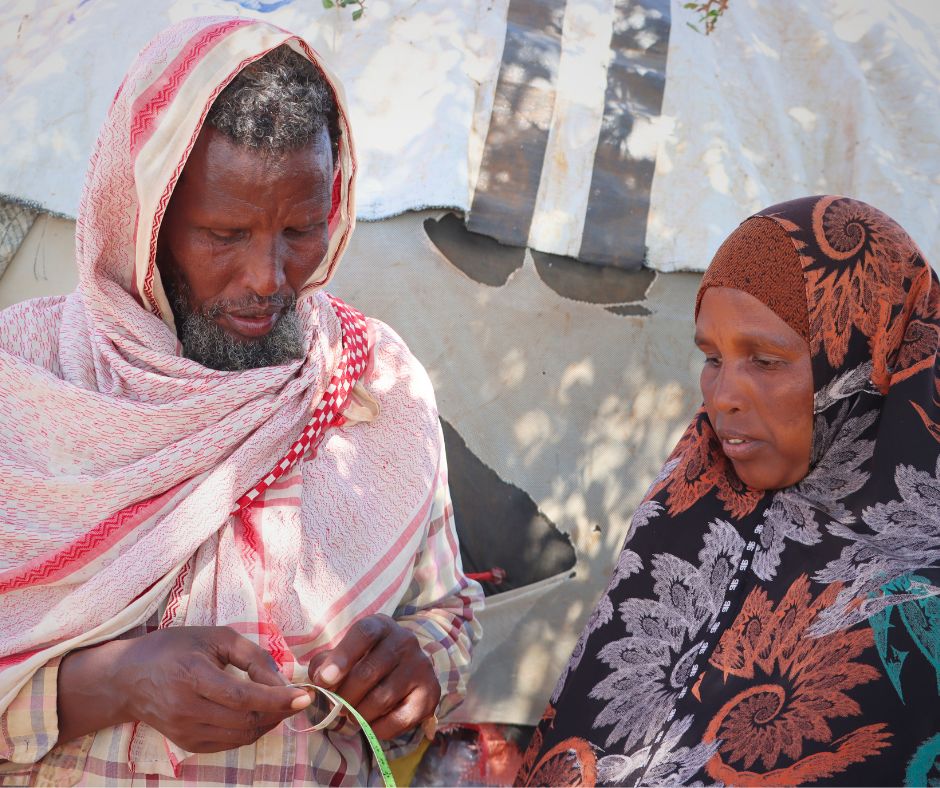10-month-old Salmaan has been sick in a displacement camp in Mogadishu for a few months now. Aden, Salaman’s father, looks around for support, but his neighbors are not better off to support them. No food and assistance were available; most of Aden’s children were easily getting sick, not knowing how to cope.
“We had nothing to eat for several days and nothing to feed our children.” Aden desperately Says.
A team of community health workers from Concern Worldwide‘s Siinka Dheer health center, doing routine community mobilization and active case finding in the IDP camps, stopped at the Diinsoor-IDP camp to screen children and refer them for intervention. Salman was among the severely malnourished children identified on that day by his low MUAC measurement of 9 cm.
“He was not feeling well for the past couple of months; he initially had measles, then later developed diarrhea, and he completely refused feeds; he was gradually losing weight as his diarrhea was persistent, and we had no knowledge about available health services.” Noted Aden.
The team handed a referral letter and advised the child to be immediately rushed to Siinka Dheer Health Center for further medical checks and support. With this opportunity coming, Aden didn’t wait any longer, and Salman was rushed to the health center. Salman successfully passed all admission criteria including the appetite test and was finally admitted to the outpatient therapeutic program (OTP). Salman’s recovery required more time. The health workers gave their best and ensured the child followed the treatment plan properly. Three months into the treatment program, the youngster was improving every week as recorded by the health workers. Aden understood the significance of the treatment for his child and brought Salman for therapy regularly while continuing to go about his day-to-day life to provide for his family. By August 2022, Salman graduated to the next treatment stage of the Targeted Supplementary Feeding Program – a treatment process to maintain moderately acute malnutrition. Aden couldn’t hold back his joy seeing Salman’s energy and smile come back to life.
“I was always asking myself if Salman would survive his current illness.” Said Aden, after discharge from the program. “we are lucky enough that Salman is healthy and survived severe malnutrition.”
The family was displaced from the Diinsoor district, 90 km away from Baidoa, six months ago due to the worsening drought situation in Somalia. That is after losing livestock because of thirst and a lack of pasture. Likewise, their farm was not producing even after several trials to cultivate.
Sinka Dheer is one of the health and nutrition centers in the Deynile district, run by Concern Worldwide through the Caafimaad Plus consortium, supporting drought- and conflict-affected populations in Somalia. The facility is situated at the center of highly populated IDP settlements in the Deynile district and provides integrated, lifesaving health and nutrition care and services to IDPs and the host communities.
Somalia is currently facing the worst drought situation of its kind in decades, the effects of climate change, high food prices, ongoing conflicts, and disease outbreaks are all making the situation very complicated and devastating. According to the latest multi-partner technical release 8.3 million people across Somalia are expected to face Crisis (IPC Phase 3) or worse acute food insecurity outcomes between April and June 2023. The total estimated acute malnutrition burden in Somalia reaches approximately 1.8 million children, including 513,550 children who are likely to be severely malnourished, through July 2023.
Caafimaad Plus Consortium – a consortium of four international nongovernmental organizations (NGOs) and three local (NGOs) is currently implementing lifesaving integrated health and nutrition programs in the areas most affected by the drought, such as Benadir, Lower Shebelle, Mudug, Bay Bakool, and Gedo, Middle Shabelle regions.








